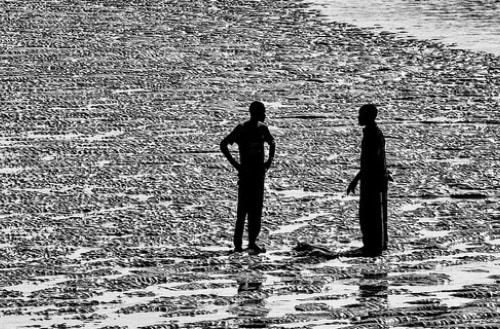Image: ‘Negotiation’ (Photo: Georgie Pauwels, Flickr).
Serendipity, perhaps. I joined the Political Settlements Research Programme at the beginning of June; my first formal engagement was on June 17, at the Political Settlements Workshop organised by the Developmental Leadership Program. It was quite an induction day.
I found myself catapulted straight into policy-oriented debates about political settlements and in just one day, I got the chance to meet a rich variety of researchers and practitioners. Of course, many of the world’s key researchers on political settlements were there – but there were also a lot of practitioners, all keen to discuss power bargaining processes and, more importantly, willing to plan and deliver aid policies differently.
It was clear from the start that the aim of the workshop was to support and develop research and thinking about politics and institutional dynamics, but also to make all of this relevant for policy and practice. It was a wonderfully interactive workshop, fully focused on how and why the concept of political settlements is useful.
At my table, we grappled first-hand with the difficulties of finding a useful definition that integrated all necessary dimensions without losing the integrity of the term ‘political settlements’. During the day, experts from around the world told us how they had applied political settlements analyses in regions such as Somaliland, Oman, Myanmar, Mexico, and the Democratic Republic of Congo.
And then, again, we had an opportunity to do rather than listen, trying to apply the approach to Lacandonia. Lacandonia was the life-sized first aid practice dummy of our workshop; a fictional nation marked by violence and citizen dissatisfaction with limited governance capacities. Through all these participative learning activities, we were encouraged to test for ourselves the potential benefits and challenges of using hands-on political settlements approaches.
It seemed to me that all my fellow participants fully accepted that the underlying power relations in the contexts in which they intervene are critically important and should be understood as clearly as possible. At the same time, they were keen-sighted about the possible pitfalls of translating this into policy and practice.
Our discussions identified a number of tensions that need to be balanced: stability versus ethics; legitimacy versus confidence; inclusion versus exclusion; the role of civil society; and economic distribution and redistribution. We considered all these elements, asking what their capacity was to enhance change while – hopefully – avoiding violent conflicts. In other words, the sessions encouraged us to look at the role international donors might play in identifying incentives for wider inclusion processes.
And yet, it seemed, there was a general consensus that without any clear or generally agreed definition of what ‘political settlements’ are, it is likely to be difficult to assess how useful the approach might be.
To conclude the day, two practitioners told us frankly what they thought.
The first mused about how political settlements analysis could possibly offer a magic solution to the challenges donors face. He wondered whether political settlements analyses might actually confuse matters and, in practice, would do little to help donors formulate real-world plans. They might instead lose sight of the need to maintain focus on the ‘messy’ facts that generally characterise power dynamics.
The second commentator put her concerns into one sentence: “Political settlements are intuitively attractive, but I would never use the concept in meetings with HoMs [Head of Mission of Embassy] – because we cannot explain it.”
And in the same spirit, on my way back home to Edinburgh I found myself wondering how the intangible nature of power can be discussed and included in a policy framework, particularly given the current structures of aid delivery, which really aren’t designed to make room for such factors.
How do we see and relate to power given its murky and intangible nature? How do we make a framework flexible enough to fit into technocratic structures without it becoming no more than a technocratic exercise?
And this, for me, was the whole point of a most valuable workshop. These are difficult questions that must be faced up to, but they can only be dealt with through engaged discussions with practitioners and through our own continuing, consistent attempts to consider, approach and deliver aid in alternative ways. I see this workshop as a crucial staging post which brought together all those who are struggling with these questions and pushed thinking about political settlements a few more steps forward.
The second commentator put her concerns into one sentence: “Political settlements are intuitively attractive, but I would never use the concept in meetings with HoMs [Head of Mission of Embassy] – because we cannot explain it.”
And in the same spirit, on my way back home to Edinburgh I found myself wondering how the intangible nature of power can be discussed and included in a policy framework, particularly given the current structures of aid delivery, which really aren’t designed to make room for such factors.
How do we see and relate to power given its murky and intangible nature? How do we make a framework flexible enough to fit into technocratic structures without it becoming no more than a technocratic exercise?
And this, for me, was the whole point of a most valuable workshop. These are difficult questions that must be faced up to, but they can only be dealt with through engaged discussions with practitioners and through our own continuing, consistent attempts to consider, approach and deliver aid in alternative ways. I see this workshop as a crucial staging post which brought together all those who are struggling with these questions and pushed thinking about political settlements a few more steps forward.










